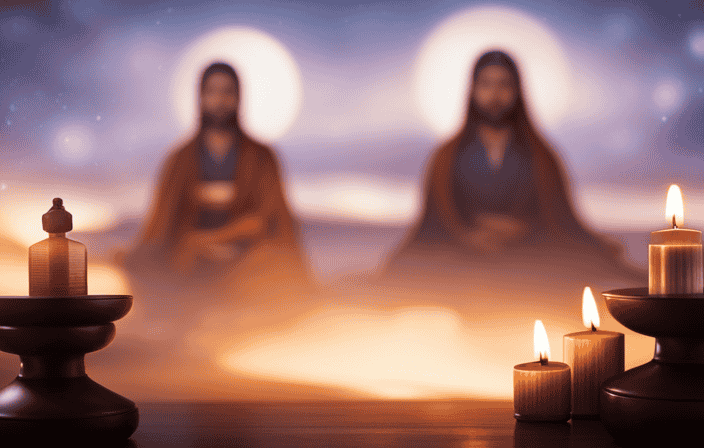Altars hold a deep sense of sacredness! In various religions, altars serve as a connection to the divine, providing a physical space for connecting with the spiritual realm.
These sacred spaces, adorned with prayers, offerings, and symbols, create an atmosphere of peace and reverence. They remind us of our spiritual journey and cultivate mindfulness in our daily lives.
Whether in Christianity, Judaism, Hinduism, or Buddhism, altars play a significant role in our spiritual traditions, offering a tangible connection to the divine.
Let us explore the profound and universal significance of altars in our quest for spiritual growth.
Key Takeaways
- Altars serve as sacred spaces for prayers, offerings, and meditation in various religions.
- They help to focus intentions and connect with spiritual forces, promoting mindfulness and enhancing spiritual connection.
- Altars can create a sense of peace, tranquility, and reverence, combating anxiety and creating a sense of calm.
- Altars serve as physical reminders of one’s spiritual practice, providing a dedicated space for spiritual growth and development.
What are Altars?
Altars are physical spaces that hold spiritual significance and serve as a sacred space for prayer, meditation, and offerings in various religions. They are physical representations of spiritual energy, creating a space for focused intentions and connecting with spiritual forces.
Altars can be found in homes as personal altars or in religious institutions as public altars. Personal altars are customized for individual practice, allowing for a closer relationship with faith, while public altars are used for collective worship and prayer.
Altars play a vital role in rituals and ceremonies, where offerings are made, candles are lit, and incense is burned. They provide a dedicated space for reflection, gratitude, and seeking solace.
Altars have been used in religious practices for thousands of years and continue to hold immense spiritual power, connecting individuals with nature and the divine.
Importance in Religion
In my spiritual journey, I’ve discovered that altars hold a profound significance in various religious traditions. They serve as a gateway to a deeper connection with the divine. Here are some reasons why altars are important in religion:
-
Sacred Space: Altars provide a designated space for prayer, meditation, and worship. They create a sacred atmosphere that fosters spiritual connection.
-
Focus and Intention: Altars serve as physical representations of spiritual energy. They help individuals focus their intentions and direct their prayers and offerings towards the divine.
-
Symbolism: Altars are adorned with religious symbols and objects that hold deep spiritual meaning. They remind practitioners of their faith and the divine presence.
-
Communal Worship: Altars in religious institutions act as a shared space for collective worship. They bring people together in their devotion and foster a sense of community and belonging.
Overall, altars play a central role in religious practices. They provide a tangible and sacred space for individuals to connect with the divine and deepen their spiritual journey.
Types of Altars
When setting up my personal altar, I customized it to reflect my individual spiritual practice and create a space for daily meditation and prayer. Personal altars are a vital part of my spiritual journey, providing a dedicated space for growth and connection with the divine. It is a place where I can find peace, tranquility, and reverence. My altar is adorned with meaningful objects and symbols that hold significance to me. It serves as a physical reminder of my spiritual practice and helps me focus my intentions. Whether I am seeking solace, expressing gratitude, or simply seeking a moment of mindfulness, my personal altar provides a sacred space for me to connect with the divine.
 |
 |
 |
Rituals and Practices
During my daily meditation and prayer, I light candles and offer incense on my personal altar to create a peaceful and focused environment for spiritual connection.
The rituals and practices associated with altars are diverse and meaningful, serving as a means to deepen one’s spiritual journey. Some of these practices include making offerings, engaging in meditation and prayer, and using the altar as a space for reflection and gratitude.
These rituals have the power to evoke a sense of reverence, tranquility, and inner peace. They provide an opportunity to connect with the divine, seek solace, and cultivate mindfulness.
Through the act of lighting candles and offering incense on my altar, I am able to create a sacred space that enhances my spiritual connection and promotes a sense of calm and clarity.
Historical Significance
Throughout history, altars have played a significant role in shaping religious practices and fostering spiritual connection. From ancient civilizations like the Egyptians, Greeks, and Romans to modern-day religions, altars have evolved in design and purpose over time, but they continue to hold immense spiritual power.
Altars have existed since 3000 BCE, when ancient civilizations prayed standing before stones or rocks. Greeks and Christians built temples and churches adorned with altars for worship. Altars have been a part of religious traditions for centuries, connecting individuals with nature and the divine. They serve as symbolic spaces for offerings, meditation, and prayer.
Altars hold a prominent place in Christian spirituality, representing Christ’s sacrifice on the cross. In Judaism, altars are used during sacrificial ceremonies to express gratitude to the divine. Hindu altars, known as Puja Mandir or Puja Ghar, are sacred spaces adorned with flowers, incense, and offerings for worship and meditation. Altars also hold spiritual significance in Buddhist practices, serving as focal points for meditation and worship. Regular practice in front of an altar has calming effects on the mind and body and represents a commitment to the spiritual path in Buddhism.
Throughout history, altars have remained an integral part of religious traditions, providing a sacred space for individuals to connect with the divine.
Christianity and Altars
In Christianity, altars hold a significant place in spiritual practices and serve as a focal point for communion and prayers to God. These sacred spaces represent Christ’s sacrifice on the cross and are adorned with religious symbols.
Altars are an essential part of Christian spiritual life, providing a physical space for believers to connect with the divine. During communion, the altar becomes the central point where the bread and wine are consecrated and shared among the congregation. It is a sacred moment of remembrance and spiritual nourishment.
Prayers are also offered at the altar, allowing individuals to communicate with God and seek guidance, comfort, and forgiveness. Altars in Christianity symbolize the presence of God and serve as a reminder of the importance of faith and devotion in the Christian tradition.
Judaism and Altars
Moving on from Christianity, let’s explore the significance of altars in Judaism.
Altars play a vital role in Jewish tradition and worship. They are used during sacrificial ceremonies and symbolize offering and gratitude to the divine.
In addition to altars, synagogues have other sacred spaces like bimahs and arks. Cleanliness of these sacred spaces is of utmost importance in Judaism.
The altars in Judaism are not only physical structures but also represent a spiritual connection with God. They are adorned with reverence and respect, creating a sacred environment for prayer and meditation.
The rituals performed on altars in Judaism are deeply rooted in tradition and serve as a way to connect with the divine. Altars in Judaism hold a significant place in the religious and spiritual life of Jewish individuals and communities, fostering a deep sense of faith and connection with God.
Hinduism and Altars
As I delve into the significance of altars in Hinduism, I am captivated by the sacred spaces that are adorned with vibrant flowers, aromatic incense, and heartfelt offerings. Hindu altars, known as Puja Mandirs or Puja Ghars, hold immense spiritual significance in our faith. They serve as dedicated spaces for worship, meditation, and connection with the divine.
The placement of the altar is carefully chosen, often facing east to symbolize the rising sun and new beginnings. Hindu rituals, such as ringing bells and lighting lamps, are performed on altars to invoke blessings and express devotion. Personalized with sacred symbols and offerings, altars in Hinduism create a serene environment that promotes peace and introspection.
Regular practice in front of an altar has calming effects on the mind and body, allowing individuals to deepen their spiritual connection and commitment to the path of enlightenment.
Buddhism and Altars
Engaging in Buddhist practices and standing before a beautifully adorned altar is like immersing myself in a tranquil oasis. The flickering candlelight and lingering incense invite a deep sense of inner calm and spiritual connection.
In Buddhism, altars hold significant spiritual importance. They serve as a focal point for meditation and worship. Personalizing these altars with sacred symbols and offerings creates a sacred space for spiritual growth and development.
Regular practice in front of an altar has calming effects on the mind and body. It allows for a deeper understanding of oneself and the world around. Altars in Buddhism represent a commitment to the spiritual path and serve as a reminder to cultivate mindfulness and compassion in daily life.
They are a physical manifestation of the divine and a gateway to spiritual enlightenment.
Altars and Nature
Now let’s explore the connection between altars and nature.
In Buddhism, altars often incorporate elements from the natural world to create a harmonious and serene atmosphere. This is because nature is seen as a manifestation of the divine and is deeply revered in Buddhist philosophy.
Altars may include elements such as flowers, leaves, rocks, and water to represent the beauty and impermanence of life. These natural elements serve as reminders of the interconnectedness of all beings and the cycles of nature.
By incorporating nature into altars, Buddhists seek to cultivate a sense of mindfulness, gratitude, and reverence for the natural world. This practice helps to deepen their spiritual connection and enhance their understanding of the impermanent nature of existence.
Creating a Personal Altar
To create my own personal altar, I gather meaningful objects and arrange them in a way that resonates with my spiritual journey. I believe that the act of creating a personal altar is a sacred and intentional practice. It allows me to connect with the divine and cultivate a sense of peace and tranquility in my daily life.
On my altar, I include items that hold deep significance to me, such as crystals, photographs of loved ones, and symbols that represent my faith. These objects serve as physical reminders of my spiritual practice and help me focus my intentions during meditation and prayer.
Creating a personal altar is a deeply personal and individualized process. It is about finding what resonates with me and using that to create a space that feels sacred and meaningful. Through this practice, I am able to deepen my spiritual connection and cultivate a sense of peace and reverence in my life.
| Objects | Significance |
|---|---|
| Crystals | Represents healing and spiritual energy |
| Photographs of loved ones | Represents connection and love |
| Symbols of faith | Represents my personal belief system |
Altars and Spiritual Growth
As I explore the role of altars in my spiritual journey, I discover that they serve as catalysts for personal growth and transformation.
Altars provide a dedicated space for reflection and self-discovery, allowing me to deepen my understanding of myself and my connection to the divine.
Through the rituals and practices performed at my altar, I am able to cultivate qualities such as mindfulness, gratitude, and compassion. This leads to a greater sense of inner peace and clarity, allowing me to navigate life’s challenges with grace and resilience.
Additionally, altars serve as a tangible reminder of my spiritual practice, helping me to stay focused and committed to my path.
Overall, the presence of an altar in my life has been instrumental in fostering my spiritual growth and evolution.
Frequently Asked Questions
How do altars differ in their design and purpose across different religions?
Altars differ in design and purpose across different religions. Christian altars represent Christ’s sacrifice and are used for communion. Jewish altars are used for sacrificial ceremonies. Hindu altars are spaces for worship and meditation. Buddhist altars serve as focal points for meditation and worship.
Are there any specific guidelines or rituals associated with setting up a personal altar?
When setting up a personal altar, it is important to consider your spiritual beliefs and intentions. There are no specific guidelines, but common practices include selecting meaningful items, arranging them with care, and dedicating the space for meditation, prayer, or reflection.
Can altars be used for purposes other than prayer and meditation?
Altars can serve various purposes beyond prayer and meditation. They can be used for rituals, ceremonies, and offerings. Additionally, altars can be a source of inspiration, reflection, and spiritual growth. They provide a sacred space for connecting with the divine.
Are there any specific symbols or items commonly found on altars?
Yes, there are specific symbols or items commonly found on altars. These can vary depending on the religious or spiritual tradition, but examples include candles, incense, statues or images of deities, flowers, and sacred texts.
How do altars help individuals connect with the divine and enhance their spiritual journey?
Altars help me connect with the divine and enhance my spiritual journey by providing a dedicated space for prayer, meditation, and reflection. They serve as a physical reminder of my faith and allow me to focus my intentions and cultivate a sense of peace and tranquility.









